
Published: September 6th, 2025 • Last Updated: September 6th, 2025
Author: Ross Taylor on AskRoss.ca
Everything First-Time Buyers Need to Know About Mortgages, Lenders, and Pre-Approval
Recently, someone reached out to me with a thoughtful list of questions about buying their first home. They are a new parent and wanted to make sure that, when we eventually spoke in person, we’d both be ready for a productive conversation.
Frankly, their list of questions was so good I thought it was worth sharing here, because these are exactly the kinds of questions I wish more first-time buyers would ask before diving into the market.
Here’s how I answered them.
Jump to a specific section in this article ↓↓
- Do you have experience working with first-time buyers?
- What types of mortgages do you specialize in?
- Where do you service?
- What lenders do you typically work with (A, B, or private)?
- Which lender should I work with based on my situation?
- What fixed and variable rates are you currently seeing for a first-time buyer?
- What is your pre-approval process, and what documentation will you need from me to get started?
- What documents do I need for a formal pre-approval in Canada?
- How are you compensated for your services?
- How do you advise clients on prepayment options, penalties, and portability of a mortgage?
- Are you licensed?
- What is the maximum annual lump sum payment percentage allowed towards the principal?
- What is the typical amortization period you recommend for first-time buyers?
- Are there any first-time home buyer assistance programs or incentives in Ontario?
- Can you provide any other fees I should be aware of?
- How long does the entire mortgage process typically take?
- Do you have a network of other professionals you can recommend?
- All of the FAQs in this article: What Are First-Time Homebuyer Mortgage Questions Every Canadian Should Ask?
- Additional FAQs for Canadian FTHB

Do you have experience working with first-time buyers?
Absolutely. We’ve helped thousands of first-time buyers navigate the process from your pre-approval, “we think we might be ready,” to your closing day, “here are your keys.”
In fact, we have a dedicated section on our website for first-time buyer mortgages and blog articles to answer the questions we hear the most.
Why experience matters
Your first home purchase involves moving parts you encounter only once.
From down payment sources to default insurance rules, the stress test, and closing costs are all new territory.
You want a broker who anticipates your questions and explains options before you ask for them.
↑↑ Back to the list at the top ↑↑

What types of mortgages do you specialize in?
Ross Taylor Mortgages is one of Canada’s most knowledgeable and trusted mortgage brokers, delivering award-winning services to all of our clients.
We specialize in helping first-time homebuyers and clients with more complex mortgage needs (often called “difficult mortgages”).
First-time homebuyer mortgages
Buying your first home is exciting, but it’s also a lot to take in. Between stress test rules, down payment strategies, and navigating programs like the FHSA, RRSP Home Buyers’ Plan, and land transfer tax rebates, the process can feel overwhelming.
My team and I simplify it for you.
We’ll walk you through how much you can afford, explain the trade-offs between fixed and variable, and help you lock in the best rate available for your situation.
Difficult mortgages
Not every mortgage application fits neatly into a bank’s box — and that’s where our experience shines. We specialize in helping Canadians with:
- Complex income (self-employed, variable pay, or contract work)
- Past credit challenges or limited credit history
- Higher debt loads or unique financial circumstances
- Unconventional properties that traditional lenders might avoid
In these cases, we work tirelessly to package your file properly, find the right lender (whether A, B, or private), and get you approved at the most favourable terms available.
That means strategizing your down payment, securing pre-approval, locking in interest rates, and ultimately sealing the deal with a lender who’s the right fit for you.
↑↑ Back to the list at the top ↑↑

Where do you service?
We proudly provide award-winning mortgage services across Canada, with offices in Toronto, Mississauga, Richmond Hill, and Ottawa. We also service Markham, Vaughan, York Region, and the rest of the GTA.
At Ross Taylor Mortgages, my team and I work tirelessly to secure the best possible results for every client, no matter their situation, anywhere in Canada.
If you want great service from someone you can trust, reach out to us today.
↑↑ Back to the list at the top ↑↑

What lenders do you typically work with (A, B, or private)?
All of the above.
My team and I work with A-lenders like major banks and credit unions, B-lenders for clients who need a more flexible approval process, and private lenders for unique situations.
- A lenders: These include major banks, credit unions, and monoline lenders (lenders that only offer mortgages).
- B/Alternative lenders: Useful for clients who are self-employed, have lower credit scores, or have non-traditional income.
- Private lenders: These are short-term solutions for clients who don’t currently qualify for A or B lending but are working toward it.
We have a great team of dedicated underwriters, each of whom is highly specialized in their own area.
That means whether your file is ultra-prime, has some bumps in the road, or needs a creative short-term solution, we’ll match you with the best underwriter and lender to find the best path for you and your situation.
↑↑ Back to the list at the top ↑↑

Which lender should I work with based on my situation?
One of the biggest advantages of working with a mortgage broker is having access to a wide range of reputable lenders, beyond what the bank offers.
The right fit depends on your income, credit history, property type, and future plans. Here’s how I usually break it down:
When can I work with an A-lender?
These are the big banks, credit unions, and “monoline” mortgage finance companies. They offer the best rates and most competitive terms, but only if you meet their strict criteria.
- You’ll typically need good credit (680+ for most products).
- Stable, provable income is key — salaried employees with T4’s usually have the easiest time here.
- Debt ratios (how much of your income goes toward debt payments) must fit within tight limits.
- Great option if your file is straightforward and you want the lowest possible borrowing cost.
When should I work with a B-lender?
These lenders are often called “alternative” or “near-prime.” They’re designed for Canadians who don’t quite fit the A-lender box.
- More flexible with credit scores (can work with 550+, depending on the file).
- Helpful for self-employed buyers whose taxable income doesn’t reflect their real cash flow.
- Useful if you have higher debt loads, past credit issues, or recently established credit.
- Rates are higher than A-lenders, but approvals are more forgiving.
- Often used as a stepping stone, after a year or two of on-time payments, many clients graduate back to an A-lender.
When do I need a Private lender?
Private mortgages are a short-term solution, not a long-term plan. They’re funded by individuals, mortgage investment corporations, or specialty firms.
- Commonly used for bridge financing, when you buy before your sale closes.
- Useful if you’re buying an unconventional property that banks won’t touch.
- A good fallback for urgent closings when there isn’t time for a traditional approval
- Interest rates and fees are higher, so the goal is usually to exit back to a B or A-lender as soon as possible.
How do we help you decide which lender to work with?
It’s not about “good” or “bad” lenders; it’s about finding the right match for your circumstances today and setting you up for better options tomorrow.
When we review your file, we will map out all of the best options for you and explain the trade-offs, so you’ll always know why we’re going in a particular direction.
↑↑ Back to the list at the top ↑↑
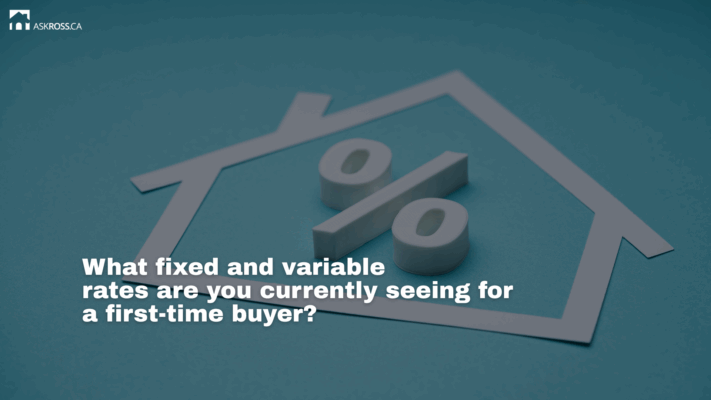
What fixed and variable rates are you currently seeing for a first-time buyer?
This one sounds straightforward, but mortgage rates aren’t a one-size-fits-all answer, and they don’t actually depend on whether or not you’re a first-time buyer.
Rates vary based on all of these factors:
- Whether the mortgage is insured (less than 20% down), insurable, or uninsurable
- What does your income and employment look like? How stable is it?
- What is your credit score and history?
- What is your down payment percentage?
- What is the location and property type of the home you want to purchase?
- Will the property be owner-occupied or a rental property?
- What is your closing date?
- Various other market factors, like Canadian bond yields and the Bank of Canada policy.
And yes, rates can literally change from a Friday to the following Tuesday if there’s a big shift in the economy.
The good news?
We have access to dozens of lenders and constantly monitor rates, so we can match you with the best option for your situation when you’re ready.
For real-time updates on the latest rates → Best Mortgage Rates Canada (Compare 40+ Lenders) | WOWA.ca
↑↑ Back to the list at the top ↑↑
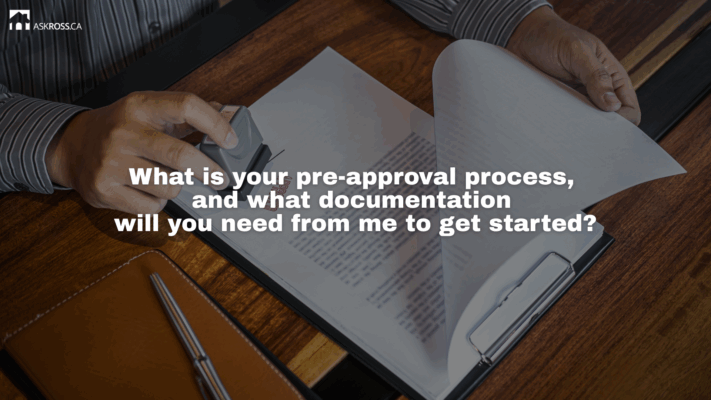
What is your pre-approval process, and what documentation will you need from me to get started?
It depends on what you mean by “pre-approval.”
If you just want to know how much mortgage you might be approved for, we can usually give you a pretty good answer in 5–10 minutes over the phone — no documents required.
If you want a formal pre-approval certificate from a lender, that usually takes 2–4 business days once you’ve provided all the required documentation.
What documents we need depend on your personal situation:
- If you’re divorced or separated, we’ll need your separation agreement
- If you’re self-employed, we’ll need your business financials
- If you have a co-signer or guarantor, we’ll need their details too
Once we know more about your circumstances, we’ll give you a tailored list so you can gather everything in one go.
↑↑ Back to the list at the top ↑↑
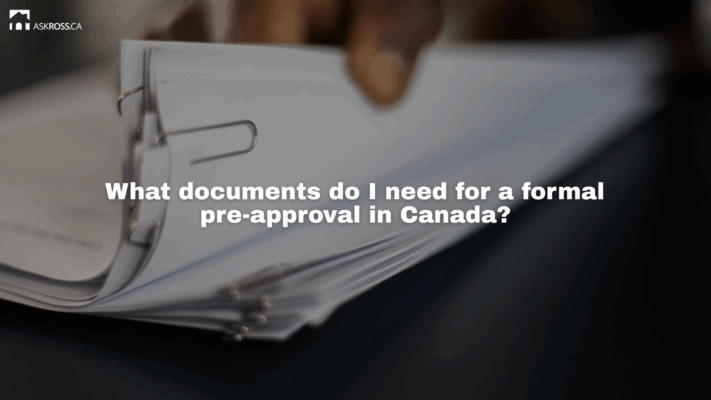
What documents do I need for a formal pre-approval in Canada?
Identification
- Two pieces of ID, one of which should be government-issued ID (e.g. driver’s license, passport)
- Social Insurance Number
- We cannot accept your health card as a form of identification
Income & Employment Verification
- Recent pay stub
- Letter of employment (job position, duration, salary)
- T4 slips for the past two years
- Self-employed: Notices of Assessment (NOA) for the past two years and the last two years of tax returns (T1 General)
- T4A, if applicable
- Proof of additional income (bank statements, contracts, etc.)
Down Payment & Assets
- Proof of down payment (90-day history from bank/investment accounts)
- Gift letter (if some/all down payment is a gift)
- We will provide you with the correct gift letter template once a lender has been selected, as they are all unique to each lender, and not an industry standard form
- Statements for RRSP, TFSA, investments, real estate, vehicles
- Copy of deposit cheque or receipt (if purchasing)
Debts & Financial Obligations
- Statements for credit cards, lines of credit, car/student loans, etc. This is usually only if we are refinancing or need to prove there is no longer a balance owing
- Details on child or spousal support payments (if applicable)
- Most recent mortgage statement (if you already own property)
- Property tax bill/statement (if you own property)
Property Details (if you’ve made an offer)
- Purchase and sale agreement
- MLS listing (realtor version) or detailed property listing
- Appraisal (if required, we will arrange it for you)
- Status (strata) Certificate (if buying a condo)
- Void cheque (for mortgage payment setup)
- Contact information for the realtor and your lawyer
↑↑ Back to the list at the top ↑↑

How are you compensated for your services?
When we arrange a mortgage with an A-lender (banks, credit unions, etc.), they pay our brokerage directly once the mortgage is funded. The fee is split between the brokerage and our team.
If we use a B-lender or private lender, there may be brokerage fees, and we’ll outline those in advance so there are no surprises.
↑↑ Back to the list at the top ↑↑
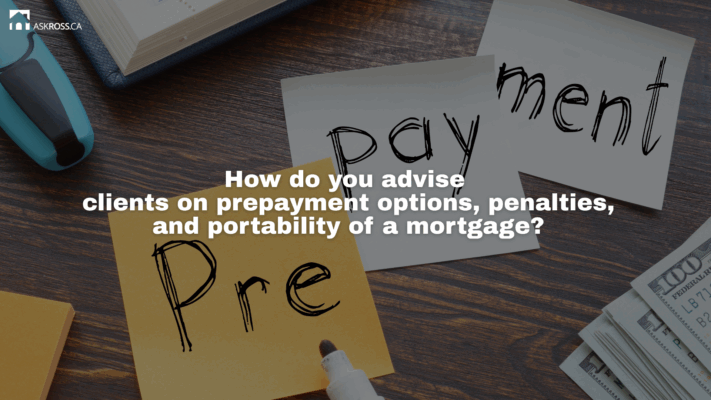
How do you advise clients on prepayment options, penalties, and portability of a mortgage?
These details vary from lender to lender, so we go over them once we’ve narrowed down the best lender and product for you.
That way, you’re getting advice that’s accurate for your exact mortgage, not just generic rules of thumb.
↑↑ Back to the list at the top ↑↑
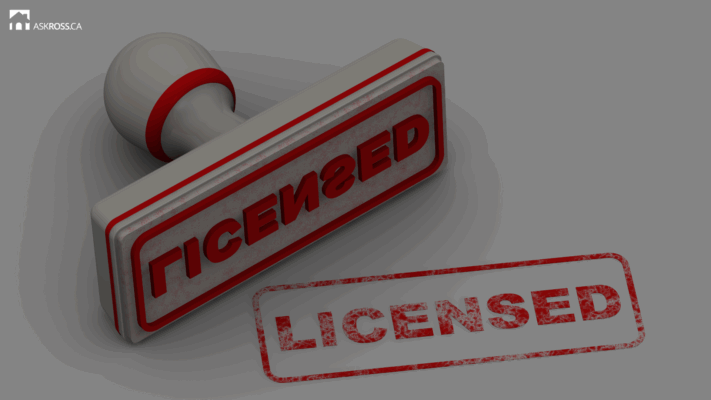
Are you licensed?
Yes. I’ve been licensed since 2006 — license #M08006631. You can confirm this on the FSRA website.
↑↑ Back to the list at the top ↑↑
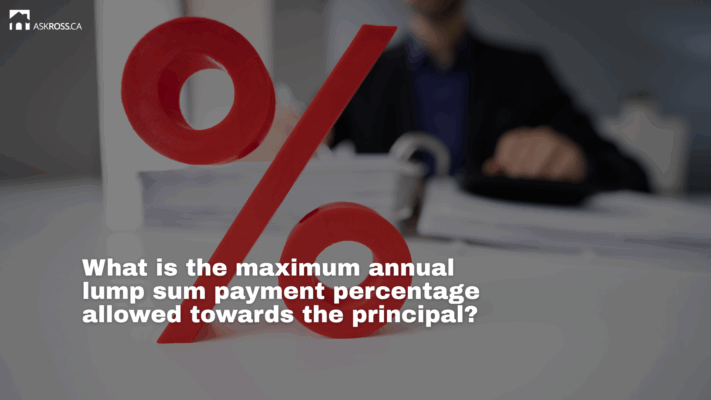
What is the maximum annual lump sum payment percentage allowed towards the principal?
Most of the lenders we work with allow up to 15% of the original principal each year, without penalty. 20% is sometimes available with a few lenders too.
↑↑ Back to the list at the top ↑↑
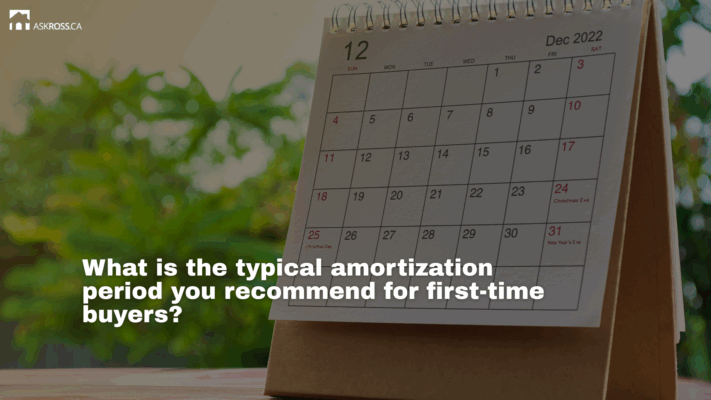
What is the typical amortization period you recommend for first-time buyers?
Most of the time, I recommend a 30-year amortization, not because it’s “better” in the long run, but because it often makes qualification easier and keeps payments lower in the first few years.
It gives you time to adjust to the costs of homeownership.
You can always pay more and shorten your amortization later, but you can’t easily go from 25 years back up to 30 once the mortgage is set.
↑↑ Back to the list at the top ↑↑
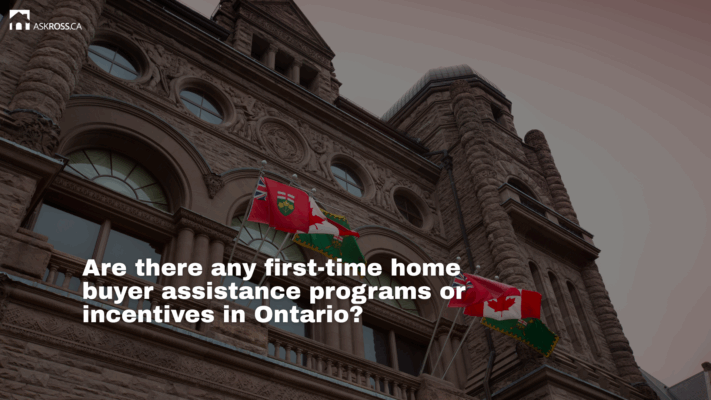
Are there any first-time home buyer assistance programs or incentives in Ontario?
Yes, and some depend on the city you’re buying in. Broadly speaking, you should look into:
- First Home Savings Account (FHSA) – my personal favourite for tax-advantaged saving, explained here
- RRSP Home Buyer Plan – allows you to borrow from your RRSP without tax consequences
- Land Transfer Tax rebates – automatically available for first-time buyers in Ontario
You can also use my Land Transfer Tax calculator to estimate your costs.
↑↑ Back to the list at the top ↑↑

Can you provide any other fees I should be aware of?
Beyond standard closing costs, there are a few extras that can surprise buyers, things like status certificates for condos, title insurance, or appraisal fees. I’ve covered them in detail in → What Are All Of The Closing Costs In Canada
↑↑ Back to the list at the top ↑↑
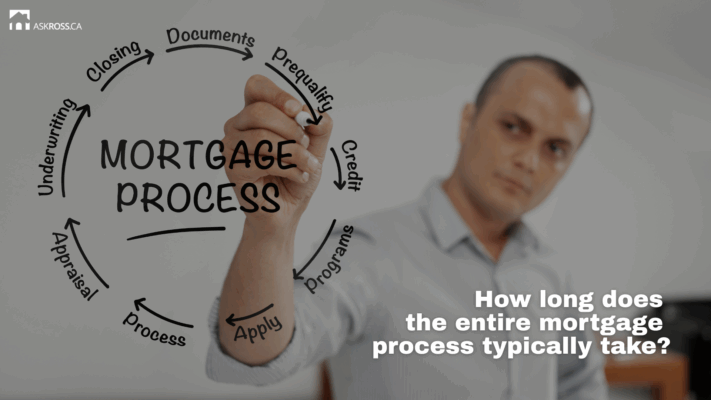
How long does the entire mortgage process typically take?
A pre-approval can be done in a matter of days. But the full process, from accepted offer to closing, usually takes a few weeks to a few months, depending on your purchase date.
Some people get pre-approved and don’t buy right away, so their file may need updating before they’re ready to close.
↑↑ Back to the list at the top ↑↑

Do you have a network of other professionals you can recommend?
Absolutely.
We work with both A-lenders and private lenders, and we can offer flexible solutions to Canadians from all walks of life.
Whether you’re a first-time buyer, self-employed, or working through a challenging credit history, my team and I know how to package your file so you get the most favourable approval possible.
We can also connect you with trusted real estate agents, lawyers, and other professionals, and we will tailor recommendations to the area where you’re buying.
↑↑ Back to the list at the top ↑↑

How we will help you as our client
Buying your first home comes with a lot of questions, and rightly so.
From figuring out your budget to choosing the right lender, understanding pre-approvals, and navigating government incentives, there are a lot of moving parts.
The good news? You don’t have to figure it all out alone.
At Ross Taylor Mortgages, we’ve built our reputation on helping Canadians in two key areas: first-time homebuyers and clients with more complex mortgage needs.
Whether your file is straightforward, self-employed, or a little more challenging, my team and I know how to package your application, match you with the right lender, and guide you through every step of the process.
If you want trusted advice, award-winning service, and a mortgage strategy that truly fits your life, reach out to us today.
↑↑ Back to the list at the top ↑↑

Ross Taylor Mortgages
If you want great service from someone you can trust – reach out to us today.
Get quick answers to your questions, no matter how difficult – 7 days a week.

All of the FAQs in this article: What Are First-Time Homebuyer Mortgage Questions Every Canadian Should Ask?
Do you have experience working with first-time buyers?
- Yes, we have helped thousands of first-time buyers from pre-approval to closing, with resources dedicated to their unique needs.
What types of mortgages do you specialize in?
- We specialize in first-time homebuyer mortgages and more complex “difficult” mortgages, helping clients with unique income, credit, or property situations.
Where do you service?
- We provide mortgage services across Canada, with offices in Toronto, Mississauga, Richmond Hill, and Ottawa, as well as the GTA and beyond.
What lenders do you typically work with (A, B, or private)?
- We work with A-lenders like banks and credit unions, B-lenders for flexible approvals, and private lenders for unique or short-term situations.
Which lender should I work with based on my situation?
- The right lender depends on your credit, income, property type, and goals, and we review your file to map out the best options.
When can I work with an A-lender?
- A-lenders are best for borrowers with strong credit, stable income, and low debt ratios, offering the lowest rates and best terms.
When should I work with a B-lender?
- B-lenders are often ideal if you are self-employed, have lower credit scores, or higher debt loads, with more flexible approvals at higher rates.
When do I need a Private lender?
- Private lenders are short-term solutions for unique properties, urgent closings, or when you do not qualify with A or B-lenders.
How do we help you decide which lender to work with?
- We match you with the right lender for your situation today while planning for better long-term options, explaining trade-offs clearly.
What fixed and variable rates are you currently seeing for a first-time buyer?
- Rates vary based on down payment, credit, income, property type, and market conditions, and we monitor dozens of lenders for the best match.
What is your pre-approval process, and what documentation will you need from me to get started?
- We can estimate in 5–10 minutes by phone, while a formal pre-approval takes 2–4 business days after receiving the required documents.
Generally, what documents do I need for a formal pre-approval in Canada?
- You will need ID, proof of income, tax returns, down payment verification, debt statements, and property details if you have made an offer.
How are you compensated for your services?
- For A-lenders, the lender pays us directly, while with B or private lenders, fees may apply and are disclosed upfront.
How do you advise clients on prepayment options, penalties, and portability of a mortgage?
- We review these details after choosing the best lender and product, so the advice is tailored to your exact mortgage.
Are you licensed?
- Yes, licensed since 2006 under license #M08006631, verifiable on the FSRA website.
What is the maximum annual lump sum payment percentage allowed towards the principal?
- Most lenders allow up to 20% of the original principal each year without penalty.
What is the typical amortization period you recommend for first-time buyers?
- We usually recommend 30 years to make qualification easier and keep payments lower at the start, with the option to pay more later.
Are there any first-time home buyer assistance programs or incentives in Ontario?
- Yes, including the First Home Savings Account, RRSP Home Buyers’ Plan, and Ontario Land Transfer Tax rebates, with some city-specific programs.
Can you provide any other fees I should be aware of?
- Beyond closing costs, buyers may face condo status certificates, title insurance, and appraisal fees.
How long does the entire mortgage process typically take?
- Pre-approval can be done in days, while the full process from offer to closing usually takes weeks to months.
Do you have a network of other professionals you can recommend?
- Yes, we can connect clients with trusted real estate agents, lawyers, and other professionals in their buying area.
↑↑ Back to the list at the top ↑↑

Additional FAQs for Canadian FTHB
What credit score do I need to qualify for a mortgage in Canada?
- Most A-lenders require a score of 680+, while B-lenders may accept 550+, depending on the file.
How much down payment do I need as a first-time buyer in Canada?
- At least 5% for homes under $500,000, with higher requirements above that, though saving more reduces payments and insurance costs.
Can I buy a home in Canada with zero down payment?
- Not typically, but you can use gifted funds, RRSP withdrawals under the Home Buyers’ Plan, or borrowed funds if they meet lender criteria.
- There are also some programs which allow for the down payment to come from borrowed funds. These do not occur often and approval is only given to applicants who are overall very sound, with the exception of a lack of savings. A typical profile may be a two income household not long graduated from university. Strong credit, employment and income to compensate for lack of down payment.
How does mortgage default insurance work in Canada?
- If you put less than 20% down, you must buy mortgage default insurance (e.g., CMHC), which protects the lender but allows smaller down payments.
What is the difference between pre-qualification and pre-approval in Canada?
- Pre-qualification is an informal estimate without document review, while pre-approval involves a detailed check of your credit and documents.
How do interest rate changes affect first-time buyers in Canada?
- Higher rates reduce borrowing power and increase payments, making budgeting and rate-locking more important.
Are closing costs tax-deductible for Canadian first-time homebuyers?
- No, but you may be eligible for credits like the First-Time Home Buyers’ Tax Credit and GST/HST rebates on new builds.
↑↑ Back to the list at the top ↑↑

 Apply For a Mortgage
Apply For a Mortgage